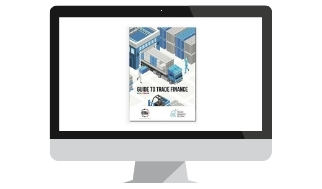TFG heard from Robert Meters on the impact of the pandemic on trade credit insurance and the recent Covid-19 initiatives including digital approaches by SCHUMANN.
Featuring: Robert Meters (RM), Head of Marketing and Sales, Global Business & Financial Services at SCHUMANN
Host: Deepesh Patel (DP), Editor, Trade Finance Global
TFG heard from Robert Meters, Head of Marketing and Sales, Global Business & Financial Services at SCHUMANN. He has been in the credit risk management industry since 1993 and has worked for leading information service providers as well as in the telecommunications industry.
At SCHUMANN, he is responsible for global business and the Financial Services division. He advises and takes care of customers in the automation of credit decisions and the implementation of a fully integrated credit management workflow system that also supports KYC processes.
SCHUMANN offers a leading credit risk management solution with excellent references in industry, trade, leasing, factoring, banking, trade credit and surety bond insurances.
Deepesh Patel (DP): Robert, thank you very much for joining us on Trade Finance Talks TV. A pleasure to have you on the show.

CPRI in 2020
It’s been quite the year for CPRI and trade, right? Compared to our 2020 predictions at the start of the year, things turned out quite differently, right? How’s 2020 been for SCHUMANN and your clients?
Robert Meters (RM): Already in 2019 we saw a generally weak global trade of goods and service growth of 1.5%. Considerable challenges flank growth expectations of national economies and international trade. Just to name a few: The automotive industry is in a process of transformation. Brexit is changing the economic relations between continental Europe and U.K. The disputes between the US and China are putting a strain on international markets. These circumstances have created an economic starting position, as set out in the predictions, and naturally have an additional impact on the current economic crisis.
The global economic crisis triggered by Covid-19 aggravates the situation in an all-encompassing and incomparable way. A negative impact on supply chains is likely to happen in view of an expected up to 30% decline in trade and trade finance according to the International Chamber of Commerce (ICC) 11th annual Global Survey on Trade Finance 2020 and an expected rise in insolvencies worldwide of 26% (Atradius) to 35% (Euler Hermes) by 2021. A 5% contraction in 2020 global GDP is likely to happen and hopefully followed by a 6.5% recovery in 2021 according to Atradius. Of course, there is still high uncertainty.
The assessment and monitoring of political and economic risks is an essential part of corporate management as well as of trade credit and surety bond insurances. In recent years, corresponding projects for digitization in risk management have been implemented in all industries. This trend is continuing this year, which is not surprising. Although business volumes shrink, companies needed to implement risk management solutions on short notice.
In addition to risk management there is a high need to transform Know Your Customer (KYC) checks, countering anti-money laundering (AML) and the financing of terrorism (CFT) as well as those regulations related to international sanction digitally.
Therefore, SCHUMANN has been able to continue its growth course in 2020, because the topic of credit risk management and digital transformation of processes is on the top priority list for our clients. The companies, financial service providers, banks and insurance companies in the trade credit and surety bond segments that have already invested in our IT solutions have come through the crisis stronger.
Atradius Exclusive: The Asian insolvency storm – trade credit insurance overview

Trade credit insurance during Covid-19 – change of role?
DP: Taking a step back, what is the role of credit insurance in global trade and finance?
RM: By covering default risks, credit insurances ensure a significant reduction in credit risk, which gives trade and trade finance the scope for business transactions and growth. Credit insurances secure the granting of limits. To do so, policyholders must fulfil obligations. These include, for example, procedural instructions and notifications of non-payment by debtors.
DP: What is the role of trade credit insurance in the real economic crisis we are seeing now? Is the government backstop that has been offered by some governments enough to keep the TCI market running?
RM: Credit insurance is particularly important in the economic crisis for stabilising the economy. However, the insurance industry will face major challenges in the future once state guarantees have ended. Governments are currently considering whether an extension of guarantees should take place. A wave of insolvencies is threatening in those countries where the insolvency applications that have been blocked so far, the termination of short-time working subsidies and the repayment of transitional loans are to take place in the coming months.
Reductions and cancellations of limits can be expected as well as conservative underwriting for new limit requests and non-renewals for Reductions and cancellations of limits can be expected as well as conservative underwriting for new limit requests and non-renewals for certain industries from cancelable limit insurers. Non-cancelable limit insurers may force their insured to monitor risk and take sufficient measures as soon as losses can be expected. Discretionary limits may need to be cut. Insured companies are required to quickly adapt their credit decisions to new insurance obligations in view of the respective risk situation. In the Corona crisis the three big credit insurers already increased overdue debt reporting period to support the insured.
Technology for assessing risk – new demands in trade credit, surety bonds and insurance
DP: The need for technology has never been more important, not only because entire industries have been unable to go back to the office, but also because we need to look at new innovative approaches for credit management techniques and financial statement analysis – what has SCHUMANN been doing to help its clients?
RM: Credit risk specialists from all sectors – industry, trade, financial institutions, banks, trade credit and surety bond insurance companies – use SCHUMANN IT solutions for risk assessment and monitoring as well as debt collection.
It is essential to consolidate all data in order to assess and monitor a risk situation. For example, an API-Gateway to 50 partners in the information industry and trade credit insurances is available for this purpose. Supported by AI, all available own payment experiences with debtors are monitored.
Financial data analyses and simulations of financial data for predictions of expected defaults complete the information base. The software provides digital workflows and decision engines using the database for digital process control and automation. Intelligent techniques for the aggregation and evaluation of data support early warnings and enable concrete management by exception tasks for credit risk experts and in debt collection.
Automated, digital processes take over such routine tasks, can process and analyze large amounts of data, which cannot be done manually or efficiently by humans. This has considerably reduced the workload in the home office. At the same time, the information necessary for decision-making processes was available digitally at any time for every decision-maker at every location. And after all, it reduces the risk of human error significantly.
In the current crisis, it has been crucial that standard software can be quickly made available in cloud solutions to ensure rapid implementation of modern credit risk management solutions.
PODCAST: WEF – The Fourth Industrial Revolution: Inclusive digital trade is the future (S1 E44)

The future of receivables post Covid-19
DP: Do you agree with Peter Mulroy’s thoughts on the future of receivables management and liquidity, the need for factoring has never been more important, and that post-Corona, Factoring will be in high demand during and after this crisis?
RM: The current statistics on the development of the global factoring business confirm the stabilizing effects of factoring for companies in recent months even though the total business volume in factoring has fallen significantly. It goes without saying that future waves of insolvencies will also affect the factoring industry and lead to defaults. Nevertheless, it can be expected that the rapid availability of liquidity offered to companies by factoring companies will be of increasing importance in the future to support business stability and growth.
At present, it is still difficult to assess whether factoring will develop as strongly after the current economic crisis as it did after the 2008/2009 financial crisis. The starting position for the factoring industry in the world regions and the market potentials are quite different. Possible growth rates will certainly vary from region to region, as the economies have different trading situations that are relevant for factoring. International trade relations are certainly a special feature.
However, in competition with traditional lending of banks, which are likely to be faced with increasingly high bad debts in the economic crisis and the need for sufficient risk capital buffer and higher credit costs in the future, the factoring industry is faced with considerable opportunities.
FCI Perspective: 10 Factoring Predictions in a Post-COVID World

DP: Can you give a couple of technology use-cases for credit assessment [AND/OR] factoring/receivables – has demand for this accelerated during the pandemic?
RM: Especially in times of crisis, immediate early warnings are essential. Any need for action on the part of the credit risk and TCI specialists and the experts in debt collection are immediately identified.
Changes in procedures, e.g. in the allocation of credit limits, extension of payment periods or insurance notification periods, must be implemented immediately. Necessary measures are either digitally controlled or immediately executed automatically.
Default risk changes in the portfolio should be immediately available for controlling purposes. A particular challenge is posed by the extension of payment deadlines and insolvency applications. With the IT solution described above, however, it is possible to derive future forecasts of possible defaults and to check one’s own sustainable financial stability by means of simulations.
Risk assessments also extend to checking the financial stability of suppliers who are integrated in the supply chain and on whom a company is significantly dependent. This is about the stability of supply chains and the financing of the supply chain with possible necessary exchange of suppliers.
All these digital tools have been of extreme importance for trade, trade finance and also for credit insurers in the current economic situation and will become even more needed as soon as a wave of insolvencies follows the Corona crisis.
PODCAST: Separating cat pics from invoice scans – The role of AI in trade (S1 E47)

DP: We’re excited to be partners of your SCHUMANN Conference 2020 – Digital Credit Risk Management on the 1st October. What are the key themes of this conference and who should attend?
RM: For the first time in SCHUMANN’s more than 20 year history, we are holding our annual conference virtually. In four online channels we focus on the topics “Risk assessment in times of crisis”, “Debt collection management and liquidity planning”, “Compliance” and “Technology and innovation”. The participants are managers specializing in finance, credit and risk management, compliance, debt collection, strategic controlling, digitalization and IT.
In our conference we will cover essential topics of credit risk management. We involve our customers and friendly partners and associations in the presentations and discussions to give a comprehensive picture of the requirements and solutions.
DP: What are you most looking forward to at this event?
RM: The credit risk manager community should move closer together. The conference offers the network and gives insights in a technological platform for all business partners who need to cooperate digitally. Technical innovations are discussed and important market trends for the operational and strategic digital transformation of processes are evaluated. I look forward to pioneering impulses from the credit risk community.
SCHUMANN Digital Credit Risk Management Conference

 Australia
Australia Hong Kong
Hong Kong Japan
Japan Singapore
Singapore United Arab Emirates
United Arab Emirates United States
United States France
France Germany
Germany Ireland
Ireland Netherlands
Netherlands United Kingdom
United Kingdom










Comments are closed.